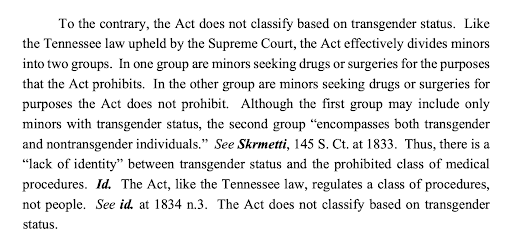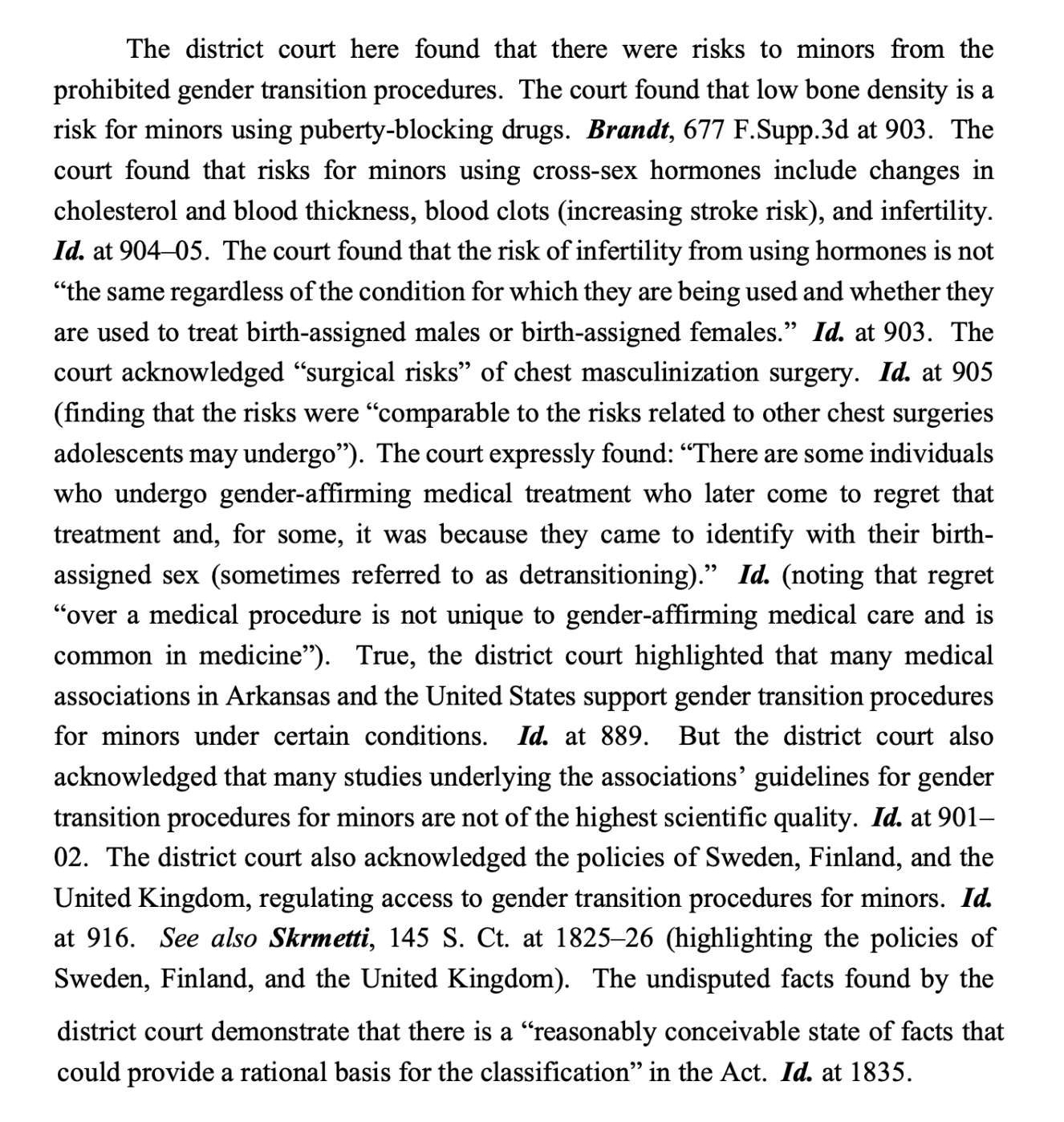8th Circuit Declares No Right of Parents to Choose Evidence-Based Trans Care
Judges also hinted that bans on adult trans care would be upheld.
by Allison Chapman
In 2021, Arkansas overrode the Governor to pass the so-called “Save Adolescents from Experimentation Act” also known as Act 626. This law prohibited healthcare providers from providing gender affirming care to minors under 18. Further, it prohibits healthcare providers from referring minors to healthcare providers for gender affirming care, such as out of state gender clinics. In May 2021, the ACLU sued on behalf of four families of transgender youth in addition to two doctors. After initial success in the district court after a judge found the medical evidence clearly favored gender-affirming care, Arkansas appealed the case, known as Brandt v. Griffin, to the 8th Circuit Court of Appeals in July 2023.
After the devastating results of U.S. v Skrmetti (2025) it was no surprise that the 8th Circuit applied the same logic to Brandt v. Griffin (2025). While Arkansas Act 626 is very similar in language to Tennessee SB1 it’s not a perfect carbon copy. The court acknowledged this by admitting the Arkansas law does not specifically mention the conditions of “gender dysphoria, gender identity disorder, gender incongruence.” However, the court determined that the Act 626 “allows healthcare professionals to address some medical concerns but not others.” This was the twisted logic the Supreme Court used to justify their claim that SB1 only classifies based on age and medical procedure and not on the basis of sex or transgender status.
Additionally, much like Skrmetti, the court refuses to determine if reasoning presented by the Supreme Court in Bostock v. Clayton County (2019) “applies in Equal Protection Clause cases because applying Bostock’s reasoning does not change the outcome of this case.” The court affirmed the findings of the district court and determined that there are risks to minors from gender affirming care using a large list of so-called “facts”. They continued by applying rational basis scrutiny and determined that the district court had found a “reasonably conceivable state of facts that could provide a rational basis for the classification.” Thus the court concluded that “the Act passes rational basis review under the Equal Protection Clause” overturning the district court.
While nothing up to this point was particularly alarming given Skrmetti, the court then went much further than the Supreme Court had.. In Brandt, the 8th Circuit took on the parent’s argument “that the Act violates their right to provide appropriate medical care for their children.” Critics of the ACLU’s approach on Skrmetti, have voiced their support for similar approaches to cases involving gender affirming care for minors. In an interview with Assigned Media earlier this month Ezra Young argued that, “It should have been framed as the state has no power to dictate medical treatment to individual kids. We don't allow the state to dictate specific medical treatment to a specific child that is contraindicated by a doctor and against the wishes of that child’s parents.” The 8th Circuit disagrees.
In its decision, the court asserted that, “parents do not have unlimited authority to make medical decisions for their children” and that “parents thus do not have an absolute right to make medical decisions for their children.” The court then applied the “deeply rooted” standard from Dobbs v. Jackson Women’s Health Org (2022) in order to determine if “this Nation’s history and tradition, as well as its historical understanding of ordered liberty, support the right of a parent to obtain for his or her child a medical treatment that, although the child desires it and a doctor approves, the state legislature deems inappropriate for minors.” The court concluded, “this court finds no such right in this Nation’s history and tradition.”
The court then reiterated its conclusion by stating, “given the two parallel currents in this Nation’s history and tradition—first, states can prohibit medical treatments for adults and children, and second, parents cannot automatically exempt their children from regulations—this court does not find a deeply rooted right of parents to exempt their children from regulations reasonably prohibiting gender transition procedures.” What I find highly concerning is their inclusion of adults in the statement “states can prohibit medical treatments for adults and children.” Their eagerness to include this in a decision regarding care for minors only, hints at their willingness to uphold future laws that prohibit gender affirming care for adults. It is a confirmed long term goal of conservatives to prohibit gender affirming care for everyone, and advocates have recently sounded the alarm due to the increasing speed in which these threats are becoming reality.
The final question answered by the court is if the Act 626’s provision prohibiting health care providers from referring patients to out of state gender clinics is a violation of the First Amendment. In order to properly assess this question, the court had to interpret the term “refer” as used in Act 626. The court defined “refer” to mean “a formal ‘referral for’ treatment, not merely informing patients about the availability of procedures.” The court went on to conclude that Act 626 only needed to survive intermediate scrutiny since it determined that Act 626 only has “an incidental effect” on the regulation of speech in the overarching goal of completely banning gender affirming care for minors. The court then concluded that Act 626 survives intermediate scrutiny since “Arkansas has a ‘compelling interest’ in protecting the physical and psychological health of minors.”
With the 8th Circuit seemingly willing to uphold a ban on gender affirming care for adults, transgender people need to brace and prepare for the worst. “It doesn't matter how deeply rooted a constitutional right is, when it comes to trans people, it no longer matters,” explained Alejandra Caraballo, a civil-rights attorney and nationally recognized LGBTQ+ rights advocate, on Bluesky. She continued, “Free speech, due process, equal protection, parental rights, etc. all are contorted with pretzel logic to ensure the outcome that harms trans people.” What seemed out of the realm of possibilities just a few short years ago seems increasingly inevitable.
Our court system is fundamentally broken. It has stripped pregnant people of their right to an abortion in the name of protecting children, while simultaneously stripping life saving healthcare away from those very children they claim to protect. It has allowed parents to claim that their rights are being infringed upon because their child was exposed to a book with a LGBTQ+ character, while simultaneously denying the parents of transgender children the basic right of making medical decisions for their child. This isn’t impartial nor logical. Caraballo posted, “it's [...] a bastardization of logic, precedent, and the constitution to uphold white christian supremacy.”
Allison Chapman is a transgender legislative researcher focusing on LGBTQ+ legislation.








